
The superfamily Ichneumonoidea contains one extinct and three extant families, including the two largest families within Hymenoptera: Ichneumonidae and Braconidae. The group is thought to contain as many as 100,000 species, many of which have not yet been described. Like other parasitoid wasps, they were long placed in the "Parasitica", variously considered as an infraorder or an unranked clade, now known to be paraphyletic.

Eupithecia is a large genus of moths of the family Geometridae. There are hundreds of described species, found in all parts of the world, and new species are discovered on a regular basis.

The lime-speck pug is a moth of the family Geometridae. It is a common species throughout the Palearctic region, the Near East and North Africa.

The common pug(Eupithecia vulgata) is a moth of the family Geometridae. It is a common species across the Palearctic region, the Near East and North Africa. It ranges from the Atlantic coast of Ireland and Portugal across Europe, the Middle East and Central Asia to the Russian Far East (Priamurje) and Korea.

The juniper pug or juniper looper is a moth of the family Geometridae. The species was first described by Michael Denis and Ignaz Schiffermüller in 1775. It is found throughout the Palearctic and Nearctic regions and the Near East.

Phengaris alcon, the Alcon blue or Alcon large blue, is a butterfly of the family Lycaenidae and is found in Europe and across the Palearctic to Siberia and Mongolia.
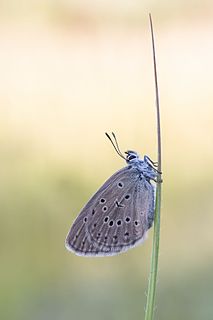
Phengaris rebeli, common name mountain Alcon blue, is a species of butterfly in the family Lycaenidae. It was first found and described in Styria, Austria, on Mount Hochschwab around 1700. Although it was initially classified as a subspecies of P. alcon, a European researcher, Lucien A. Berger, designated it as a separate species in 1946. Genetic similarities between P. rebeli and P. alcon have led many researchers to argue that the two are the same species and differences are due to intraspecific variation.

Eupithecia innotata, the angle-barred pug, is a moth of the family Geometridae. The species was first described by Johann Siegfried Hufnagel in 1767. It ranges from Spain in the west to western Siberia and Central Asia in the east.
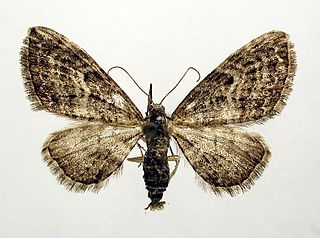
The larch pug is a moth of the family Geometridae. The species can be found in Europe, the Ural Mountains, West and Central Siberia, the Altai Mountains, Transbaikalia, Yakutia, the Far East, Mongolia, Korea, Japan and in North America, from Yukon and Newfoundland to New York and Arizona.

Eupithecia simpliciata, the plain pug, is a moth of the family Geometridae. It is found in the Palearctic ecozone, from western Europe to north-western China (Xinjiang).

Eupithecia venosata, the netted pug, is a moth of the family Geometridae. It was first described by Johan Christian Fabricius in 1787. It is found across the Palearctic ecozone from Portugal and Morocco in the west to the Lake Baikal in Siberia and Afghanistan and Pakistan in the east.
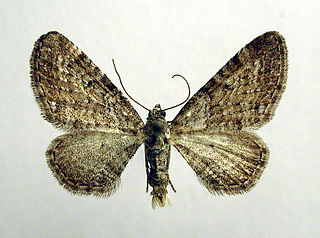
Eupithecia pernotata, or Guenée's pug, is a moth of the family Geometridae. The species was first described by Achille Guenée in 1857. It is known from the Alps, through Romania to southern Russia. It is also found in Finland.

Gentiana cruciata, the star gentian or cross gentian, is a herbaceous perennial flowering plant in the Gentianaceae family.

Eupithecia quadripunctata is a moth in the family Geometridae. It is found in India, Pakistan, Nepal, Russia, China, Taiwan, Korea, Japan and northern Thailand.
Eupithecia variostrigata is a moth in the family Geometridae. It is widespread in the western Palaearctic, ranging from Spain to the western Pamirs in the east.
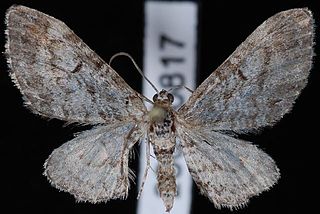
Eupithecia graefi, or Graef's pug, is a moth in the family Geometridae. The species was first described by George Duryea Hulst in 1896. It is found in North America from south-western Alberta west to Vancouver Island, north to Alaska and south to California. The habitat consists of wooded areas.
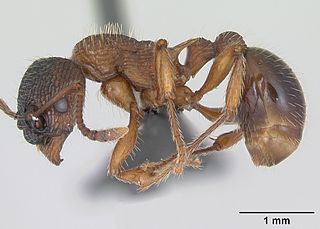
Myrmica schencki is a species of ant in the genus Myrmica.
Scrobipalpa rebeli is a moth of the family Gelechiidae. It is found in Austria, Italy, Ukraine and the Krasnoyarsk region in southern Siberia. It is also present in China (Shaanxi) and Japan.














